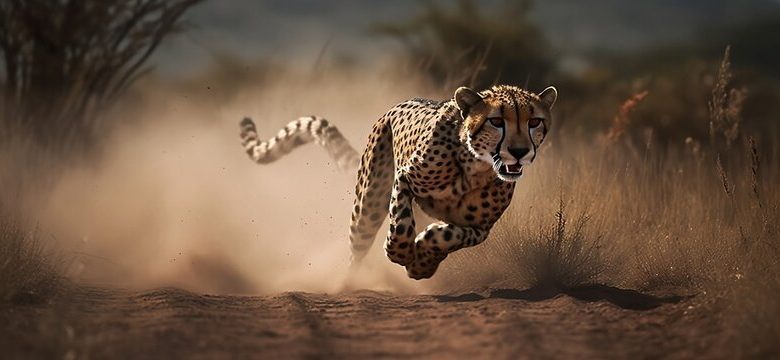Cheetahs (Acinonyx jubatus) are fascinating and iconic big cats known for their incredible speed and unique physical characteristics. Here are some key facts about cheetahs:
1. **Physical Appearance:** Cheetahs are easily recognizable by their slender build, golden-yellow fur with black spots, and distinctive “tear tracks” that run from the corner of their eyes down to the sides of their noses. These tracks help reduce glare from the sun and improve focus on prey.
2. **Speed:** Cheetahs are the fastest land animals, capable of reaching speeds of up to 60 to 70 miles per hour (97 to 113 kilometers per hour) for short sprints. They can accelerate from 0 to 60 mph in just a few seconds, making them incredibly agile and efficient predators.
3. **Habitat:** Cheetahs are primarily found in parts of Africa, particularly in savannas and grasslands. They are well adapted to open terrain where their speed and keen eyesight give them an advantage in hunting.
4. **Diet:** Cheetahs are carnivorous and primarily hunt small to medium-sized ungulates, such as gazelles and impalas. They rely on their speed and stealth to get close to their prey before launching a rapid sprint to catch it.
5. **Social Structure:** Unlike many other big cats, cheetahs are generally solitary animals, with males and females coming together primarily for mating. Brothers from the same litter often form small groups called coalitions, which can help increase their chances of survival.
6. **Reproduction:** Female cheetahs give birth to litters of one to six cubs, with the average litter size being three. Cubs are born blind and helpless and are cared for by their mother. Survival rates for cheetah cubs are relatively low due to predation and other factors.
7. **Conservation Status:** Cheetahs are considered vulnerable by the International Union for Conservation of Nature (IUCN) due to habitat loss, human-wildlife conflict, and poaching. Their population has been declining in the wild, and concerted efforts are being made to protect and conserve these magnificent animals.
8. **Unique Challenges:** Cheetahs face several challenges, including competition with larger predators like lions and hyenas, which often steal their kills. Additionally, their limited genetic diversity has raised concerns about their long-term survival.
Conservation organizations and governments are working together to implement strategies for the protection of cheetahs, such as establishing protected areas, addressing human-wildlife conflicts, and breeding programs to increase genetic diversity in captive populations. These efforts are crucial for ensuring the continued existence of these remarkable big cats in the wild.
